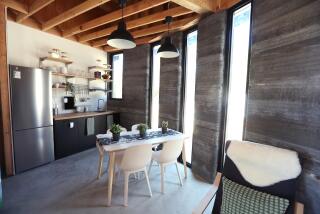Home Improvement : Modular Houses Are Energy Savers
QUESTION: I am planning to build a house soon and I was considering a modular house. Are they very energy efficient and are they basically just large mobile homes?
A: Modular houses are very well built and energy efficient. They are constructed just like a site-built house, but in the controlled environment of a factory. With strict quality control, these houses can be built very airtight and well-insulated for utility bills.
They range from small ranches to large, two-story colonials with well over 3,000 square feet of floor space. Unless you were told that the house was modular and built in factory, you would not know it from the interior or the exterior.
The larger two-story houses use several modules connected side-by-side and stacked on top of one another. The top modules are often shipped with the roof.
Modular houses are typically somewhat less expensive than comparable site-built houses.
The exteriors of modular houses can be finished in the factory with siding, or at the site with stucco, brick or siding. Stucco is a particularly energy-efficient exterior wall finish because it reduces air leakage through the walls.
Some manufacturers and builders allow you to order a modular house to varying degrees of finish. If you are handy with tools, you can do some of the finish work yourself and reduce the total costs.
A major reason for the high-quality and energy-efficient construction is transportation requirements. The modules must be built strong enough to withstand long-distance transportation on trucks.
Heavy lumber and extra fasteners and reinforcing straps are used for strength. For example, wall construction using 2x6 studs on 16-inch centers is common. The 6-inch thick walls provide space for extra insulation.
Construction in a factory offers other advantages over a site-built house. All of the building materials are stored out of the weather. In addition, certain the lumber can be nailed and fastened together better and stronger when the walls aren’t on a foundation.
You can install any type of heating and central air conditioning system. Baseboard electric heat is often used or a heat pump, for both heating and air-conditioning, can be effective.
You can write to me for Utility Bills Update No. 111 showing exterior diagrams and floor plans for five modular houses (ranch and two-story) and a list of 30 modular house manufacturers and addresses. Please include $1.00 and a self-addressed, business-sized envelope. Send your requests to James Dulley, Los Angeles Times, 6906 Royalgreen Drive, Cincinnati, Ohio 45244.
Natural Gas Is Cheaper Way to Heat Water
Q: I was wondering how much it costs to heat one gallon of hot water.
A: If you use natural gas to heat your water, it typically costs about .2 cents for each gallon of hot water. With an electric water heater, it costs several times that much. Even though the dollar savings per gallon is not great, there are other hidden costs: increased sewage/water treatment costs, increased pollution and needless of energy supplies.
More to Read
Sign up for Essential California
The most important California stories and recommendations in your inbox every morning.
You may occasionally receive promotional content from the Los Angeles Times.






